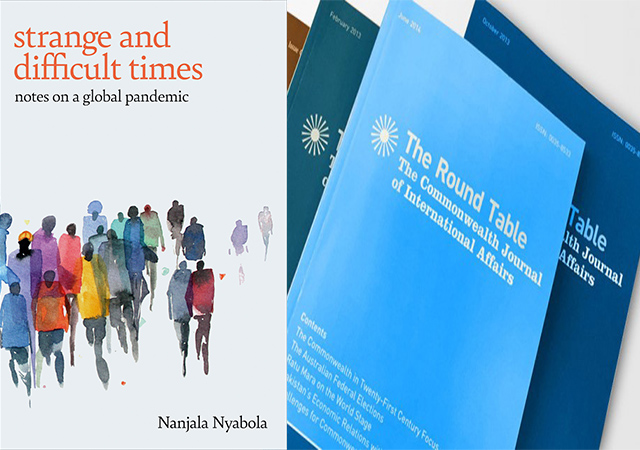
[This is an excerpt from an article in The Round Table: The Commonwealth Journal of International Affairs.]
Nanjala Nyabola’s book is a vivid reminder of how ‘strange and difficult’ the years of the Covid-19 pandemic have been. Nyabola positions herself as a ‘storyteller’ wanting to make sure that the pandemic story is told ‘properly’ (pp. x, xv). What she means by this is ensuring stories are told from beyond the ‘West’ (a term Nyabola dislikes, for good reason). In sharing experiences from Africa, and Kenya in particular, Nyabola makes clear that the African experience of the pandemic has frequently been overlooked but can teach much. With the ‘West’ seemingly desperate to return to ‘normal’, Nyabola promotes reflection and provocatively asks ‘what was so great about normal[?]’ (p. 134).
The book is constructed as a series of short essays, some just a single page long, and divided into three sections: ‘Life’, ‘Death’, and ‘Normal’. Some of the essays are stronger than others, and there is at times some repetition because of this structure. Nonetheless, the overall impression is vivid. The first part, ‘Life’, explores lockdowns, masks, and understandings of the disease. Nyabola paints a powerful picture of Nairobi, Kenya, in lockdown, including enterprising mask-makers, police beating up the un- or incorrectly-masked and the quiet of the city in lockdown. ‘Death’ asks why Africa experienced the pandemic as it did. Nyabola also argues here that some people, notably health workers and the elderly, came to seem ‘disposable’ and less worth protecting than the economy (p. 101). In ‘Normal’, Nyabola considers Omicron, Long Covid, and the ways in which the pandemic has exacerbated global disparities: rather than a ‘great equaliser’, it has proved ‘an accelerator of inequality’ (p. 125). This is Nyabola’s broad argument throughout the book: a pandemic that affected the world did not do so equally.
Covid-19 and Commonwealth countries – Special edition
Covid-19 and Commonwealth countries – Introduction
Covid-19 and Southern Africa
One of the fascinating questions driving the book is why fewer people proportionally died in Africa than in other continents. However, as Nyabola argues, to ask this can be a loaded question, weighted down by assumptions about Africa that she is at pains to unpick: ‘to ask why more Africans aren’t dying of COVID-19 is to suggest that more Africans should be dying’ (p. 90). While some may quibble with this suggestion about their motives for inquiry, Nyabola lays out plainly the racist underpinnings of much of the discourse around Africa and the pandemic. In addressing the (comparatively) lower number of African deaths, Nyabola makes suggestions including Africans spending more time outdoors, more people living in rural environments, a greater focus on preventative medicine and a strong regard for public health measures. The latter two are a result of the continent’s experience of the other major recent pandemic: HIV/AIDS. That this experience was overlooked again suggests a prejudiced view that Africa is a place to receive knowledge rather than provide it. While Nyabola does not deny problems in the responses of some African governments, including corruption, violent policing, and an unwillingness to act, these issues were certainly not unique to Africa. Many of her suggestions here are exciting and certainly worthy of the investment and further research she argues for.
Nyabola also explores the inherent racism in global responses to Covid. She highlights how travel bans in response to Omicron sometimes targeted the whole of Africa, even when Omicron was already raging through Europe.
Poppy Cullen is with Loughborough University and is a member of the Round Table editorial board.
Strange and difficult times: notes on a global pandemic by Nanjala Nyabola, London, Hurst, 2022.



